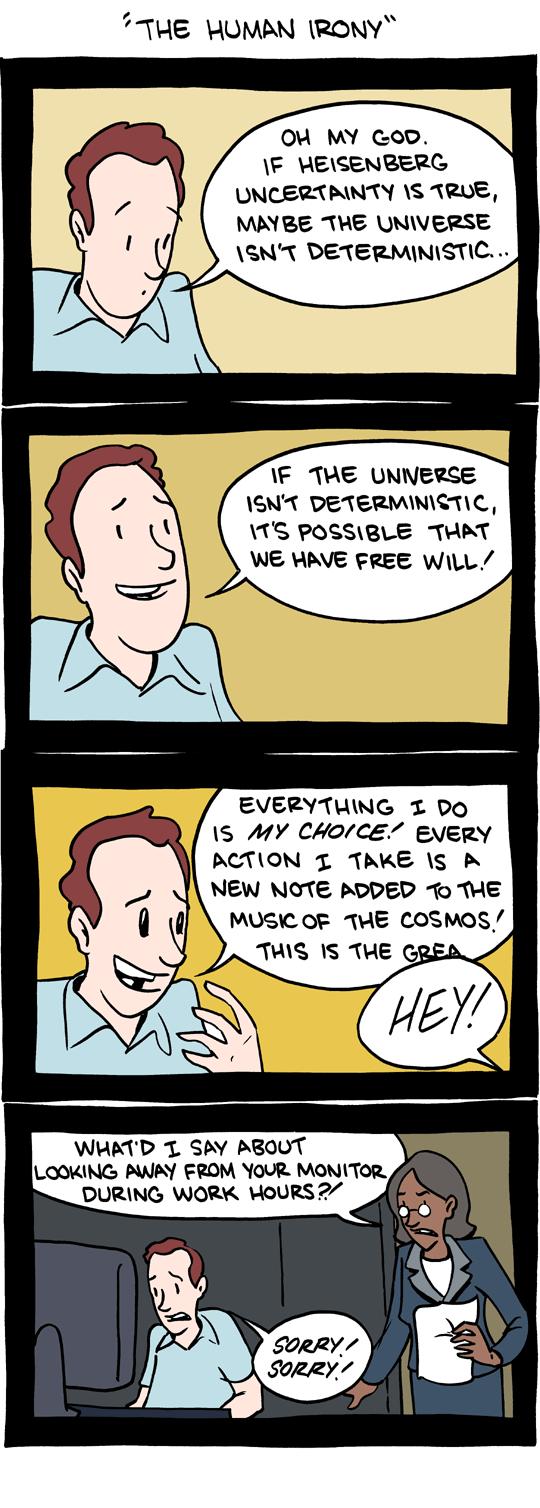Ah, this old chestnut. Several months ago I opened a thread, which never got any traction, in which I proposed a solution that I call soft of psychological compatibilism. In sum, my thesis was and remains that (i) the problem of the will is a scientific or psychological question, not a logical or philosophical one, (ii) neither libertarian free will nor determinism adequately describe how the mind works and (iii) observation suggests we generally have volition, i.e., the ability to direct our behavior and make decisions without benefit of a pre-defined decision tree, but its exercise is influenced and constrained by various factors, including genetics, socialization, personality and life experience. In the interest of brevity, I’m not repeating the entire argument here, but would request that anyone responding to this post review the linked thread. In it, I anticipate many of the obvious objections and explain why I don’t find them compelling. With that as background, I have several observations about the current thread.
First, I should like to point out that although many Dopers, in this and past threads, treat strict determinism as if it were obviously correct, this is a distinctly minority view. Among professional philosophers, compatibilism is by far the dominant view. Compatibilists say, yes, the mind is determined, but we nonetheless have the sort of free will (which I prefer to call volition) necessary to assign agency and moral responsibility. Among regular folks, some version of LFW is dominant and the foundation of criminal law, social interaction and political economics. Indeed, among Dopers taken as a whole, LFW assumptions permeate almost all debates here (e.g., should so-and-so notorious criminal be eligible for parole) except those on free will itself, in which only a small self-selected group generally participate. Many of whom, it should be noticed, are primarily interested in the implications of the issue for the theological problem of evil.
Second, I have to agree with those who argue randomness isn’t free will. As almost everyone conceives it, free will and volition have to do with agency and moral responsibility. Randomness supplies neither. Consider an example. A spider’s ability to spin a web is supplied genetically. Where it spins a particular web is determined by the random facts of where it happens to be at the time, the substrates available to anchor the web and so on. Those random facts don’t make construction of the web volitional as most people use the term. Still less does randomness in the form of quantum indeterminacy which, even if true, is so far removed from the meat of the problem as to be irrelevant. Stated a little differently, I don’t assume human thought *can’t *be deterministic. In principle, it could be just as deterministic as the spider’s, albeit more complex and similarly confounded by random factors.
Third, where I think determinism falls down isn’t that it can’t be true but that it isn’t. I explain why in the thread linked above. Consider language. We start with a genetic capacity, vocal cords, eyes, ears and speech processing centers in the brain. As we’re socialized, we’re exposed to language and learn to use it ourselves. Along the way, we pick up a vocabulary and grammar rules. Many of us even learn to think about how to use language to be more effective speakers and writers. It’s an extended process, but at some point we may be said to have a facility, a module if you will, which enables us to formulate and express ideas. Is this facility or module deterministic? I don’t think so. Obviously it was formed by a set of inputs, genetic and social, but in use it goes beyond those inputs. The whole is more than the sum of its parts. That’s what enabled Tolkein to write The Lord of the Rings, King to give powerful speeches on civil rights and us to have a conversation about free will. Something independent and supervening is going on when we use language which goes beyond the inputs. Not free of them, by any means - Tolkein and King certainly had influences - but not entirely captured or explained by them either. Nor is language the only thing of which this can be said. It can be said of the skills of a carpenter, plumber or electrician, or a hunter, warrior or baseball player, or a cook, scientist or kindergarten teacher. Indeed, I would say the hallmark of just about everything we learn is that the whole is greater than the sum of its inputs, i.e., that what we develop is a set of skills we can apply to novel problems. On this view, decision making is just another facility or module, like language and carpentry.
Fourth, what I find noticeably lacking from the position of strict determinists in this and similar prior threads is an explication of what follows if their view were accepted. As noted, it has implications for the theological problem of evil, but other than that what? If we are to do everything else the same - criminal law, social interaction and political economics - why should anyone care? Frankly, I think this is why free will threads get so little attention here.
